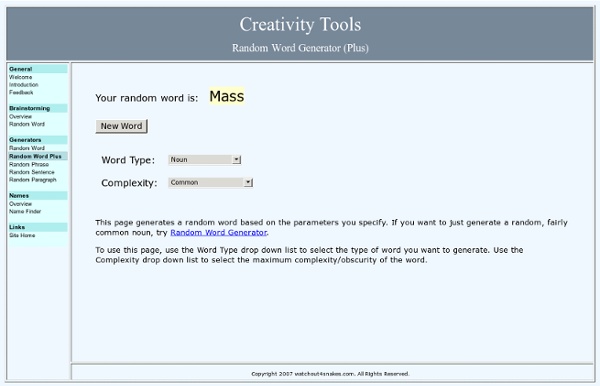



http://watchout4snakes.com/creativitytools/RandomWord/RandomWordPlus.aspx
Read These Seven Books, and You’ll be a Better Writer Donald Miller I used to play golf but I wasn’t very good. I rented a DVD, though, that taught me a better way to swing, and after watching it a few times and spending an hour or so practicing, I knocked ten strokes off my game. untitled Happy Holidays! Happy Holidays and a Happy New Year 2014 to all our fellow writers and filmmakers! Want to see THIRD CONTACT? A therapist investigates the mysterious deaths of two patients in this exploration of grief, mortality and madness. Filmmaker Simon Horrock launched a Kickstarter campaign to bring his indie feature film Third Contact into cinemas. RANDOM.ORG - True Random Number Service English 50 Exercises for Story Writers English 50 – Intro to Creative Writing: Exercises for Story Writers Basic Theory: What is a short story? As soon as someone delivers a definition, some good writer will write a story that proves the theory wrong. About the only thing we can say for sure is that short stories are short and that they are written in what we call prose. Some attributes, however, seem to show up more often than not.
Comment mettre en page votre livre Comment garantir la qualité de mise en page de votre livre ? Vous avez choisi avec soin vos polices, les espacements, les marges… pour faciliter la lecture de votre ouvrage avec un souci constant d’ergonomie et d’harmonie. Pourtant, une simple erreur technique dans la qualité d’une image, dans la cohérence des titres courants, dans la définition des fonds perdus, la finesse d’un trait… peut ruiner tous vos efforts de mise en page. Convert to cartoon - Convert photo to cartoon - Cartoonize Me - Cartoonize Free Writer’s Digest - Writing Prompts Write a scene that includes a character speaking a different language, speaking in a thick accent, or otherwise speaking in a way that is unintelligibe to the other characters. (Note: You don't necessarily need to know the language the character is speaking—be creative with it!) Describe a character's reaction to something without explaining what it is. See if your fellow prompt responders can guess what it is. Write a story or a scene about one character playing a prank on another.
40 of the Best Websites for Young Writers Jun 09, 2011 Looking for writing help, peer review, grammar tips or just a little bit of advice from the World Wide Web? Don't miss these 40 helpful websites for young writers. Eight Secrets Which Writers Won’t Tell You Image from Flickr by Lazurite This is not particularly relevant to the post, but I’m getting an awful lot of comments telling me, often a little snarkily, “it’s ‘THAT’ not ‘WHICH’”. The “don’t use which for restrictive clauses” rule comes (as far as I can tell) from Strunk and White. Plenty of authors, including Austen, have used “which” exactly as I use it in the title.
D. W. Mills Jr. Neuroses run rampant in me. I think I am, unfortunately more neurotic than most (although I've read that many other writers feel this way). You will undoubtedly see this rear its ugly face in my writing. 25 Things You Should Know About Plot Previous iterations of the “25 Things” series: 25 Things Every Writer Should Know 25 Things You Should Know About Storytelling 25 Things You Should Know About Character And now… 1. Writing Is Not Lonely, But Avoiding It Is You’ll never know what you’re made of until you sit long enough with the writing to move through the pulls for companionship (whether virtual or “real”). — Laraine Herring I am agitated at the core of myself these days. Obviously, something is happening in my spirit – some cleansing, some burning off of the chaff, some rearranging of the fragments of myself – and I am tired, teary, and baffled with life most minutes of most days. If I was smart, I’d be buried in words because of this. I’d fill pages and pages with the outpourings of my spirit. I’d read all day and all night.
25 Things Every Writer Should Know An alternate title for this post might be, “Things I Think About Writing,” which is to say, these are random snidbits (snippets + tidbits) of beliefs I hold about what it takes to be a writer. I hesitate to say that any of this is exactly Zen (oh how often we as a culture misuse the term “Zen” — like, “Whoa, that tapestry is so cool, it’s really Zen“), but it certainly favors a sharper, shorter style than the blathering wordsplosions I tend to rely on in my day-to-day writing posts. Anyway. Peruse these. Absorb them into your body. Let your colonic flora digest them and feed them through your bloodstream to the little goblin-man that pilots you.